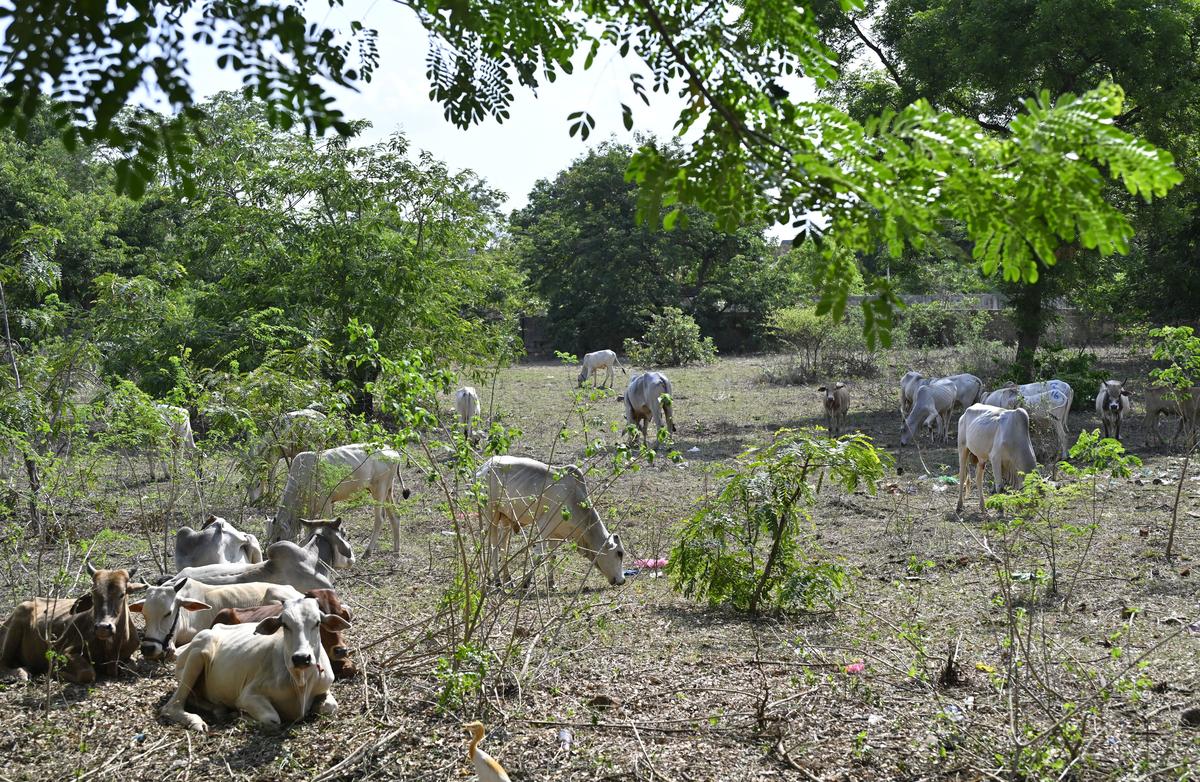Broken pieces of glass from windowpanes, smashed furniture, stones, drops of congealed blood, stretchers, and syringes litter the floor of the Medak Orthopaedic Hospital, two days after it was attacked by an enraged mob. This hospital is one of four that suffered severe damage during the communal violence on June 15, two days before Bakrid, an Islamic festival celebrated worldwide.
When the hospital reopened after three days of the violence, traumatised workers were still trying to clean up the mess and make it ready for patients. The ayah carefully collecting glass shards and sweeping the broken equipment tears up. Pointing to her legs, she says, “The men did not allow us to pull the shutter down. They blocked the shutter with wooden logs and repeatedly hit us on our legs. I am not able to walk properly now.”
Saubhagya and Jagan, two other staffers who were among the eight present at the hospital that day, tremble as they recall the haunting events of the evening.
A series of incidents on that fateful day, starting with a quarrel over cattle kept at a madrasa in Indrapuri Colony around 10.30 a.m., culminated in an attack on the Medak Orthopedic Hospital that evening, leaving many injured.
Two hospitals treating the injured from both parties involved in the attack are owned by the same management. Medak Orthopedic Hospital provided first aid to Muslim members, while Russh Hospital attended to members of the Bharatiya Janata Yuva Morcha (BJYM) — serving as an example of community harmony amid the chaos.
Medak, a small town with a population of just 46,880, is located about 90 kilometres from Hyderabad. Since the formation of Telangana in 2014, it has been a political hotspot. Local residents hint at a possible connection between the unrest and the new political regime in the constituency — the violence took place less than a fortnight after the Bharatiya Janata Party (BJP) achieved its first victory in the constituency with a 33.9% vote share. Over the past decade, the party’s vote share in the area has more than doubled from 15.4% across three Lok Sabha elections.
Those who ventured out for evening prayers leading up to Bakrid had no idea that they would end up in a hospital after decades of incident-free celebrations. The events of that day have left the population in fear and hospital managements perplexed.
As of June 19, a total of 36 people have been arrested. Among them, 13 others are from the BJP, including Medak district president Gaddam Srinivas, Medak town president M. Nayam Prasad, BJYM district president Sateesh while 23 others belong to a particular community. BJP representatives Srinivas, Prasad, and Satish have also been detained. Efforts are under way to trace and apprehend the remaining nine suspects.
How it unfolded
It was a typical Saturday morning at Minhaj-Ul-Uloom madrasa, an educational institution for Muslims. The residents had taken their 40 cattle, meant for sacrifice, out for grazing in the lush green open land behind the premises, which had turned verdant after the recent rain spells. The space also has a small pond where the cattle quench their thirst.
However, within a few minutes, a group of young men aged between 18 and 25 years began gathering in the surrounding area, clicking pictures and whispering among themselves. Before long, the small group had grown into a mob.

Cattle taken into police custody on June 15 grazing in TTD Kalyana Mandapam in Medak, a few metres from Minhaj-ul-uloom madrasa.
| Photo Credit:
NAGARA GOPAL
“They did not do anything per se. Our children alerted us about them. I, along with other seniors from the madrasa, went and stood by our cattle. The group then called the police. We did not have any fears as there were no cows in the herd. Neither did they back off nor did we,” recalls Barkaat Ahmed, the head teacher at Minhaj-Ul-Uloom madrasa which has about 55 students.
An hour later, officials from the Medak town police reached the spot and found no cows. Medak Superintendent of Police Office B. Bala Swamy says, “We checked. There were no cows in the lot; only oxen. We tried explaining that to the group which had assembled, but they refused to listen. They said the animals were young and demanded strict action.”
The standoff continued until the afternoon, even drawing higher-ups from the police department to mediate. Despite repeated calls from the Deputy Superintendent of Police for the members to disperse, none left the spot. Members of the youth group demanded that the cattle be removed from the madrasa, while the madrasa members refused to part with their cattle just two days before the festival of sacrifice.
To defuse the situation, the police decided to temporarily take custody of the oxen. Forty oxen, valued at ₹25-30 lakh, were moved to the TTD Kalyana Mandapam, a few metres from the madrasa, with the promise of returning them in a few hours, once the issue settled down. Both groups were then asked to disperse.
Around 4.30 p.m., a scuffle broke out between the two groups near the madrasa, located just 3-4 kilometres from the previous spot. Two from each group suffered injuries and were rushed to the Medak Orthopedic Hospital and Russh Hospital for first-aid and treatment.
While the treatment was under way, a mob of over 100 BJYM members, all non-locals from nearby villages, attacked the hospital located near the Medak town police station with stones, bricks and batons, around 6.30 p.m.
“We were treating the injured patients when we heard the noise getting closer. The patients’ well wishers were standing outside the ward, and we asked them to leave to avoid any unpleasant situation, but they did not listen. The people outside started throwing stones and bricks into the hospital, demanding that the patients be brought out,” shares a representative of the hospital management, requesting anonymity.
“What was our fault? We were merely doing our job and treating them. The doctors, staff members and I begged the mob not to attack the hospital. We also pleaded with the members of a particular community waiting inside the hospital to not retaliate, but no one listened to us. Many of our staff members sustained injuries on their head and legs. They are now scared to return to work,” he adds.
The mob also damaged two bikes belonging to the hospital staff and the new car of a doctor, N. Surender Reddy, who was treating two of the injured people.
The hospital management has reported losses to the tune of ₹25 lakh in the incident, including medical equipment.
The attack on the hospital lasted for 45 minutes, and several similar incidents were reported across the town until 10 p.m. This included attacks on three other hospitals — Star Hospital, Life Care Hospital, and Sufi Hospital — as well as on a general store and a pushcart on the town’s main arterial road.
Both sides of this road are lined with small shops, with narrow lanes leading to residential colonies.
Old legacy, new management
The attack on the hospital coincided with its fourth anniversary. Following the incident, videos claiming statements from ‘Dr. Naveen’ flooded social media platforms and media groups. However, these statements had actually come from a representative of the new hospital management.
Dr. Naveen is a well known figure in Medak town, where residents of all ages would have encountered him at least once. Even five years after his departure from the landmark building that was attacked by the mob, the hospital is still commonly associated with his name.
The Medak Orthopaedic Hospital occupies the site where Jayalaxmi Orthopedic Hospital, founded by surgeon V. Naveen Kumar in 2013, once stood. In 2019, Dr. Naveen shifted the hospital to a new location about two kilometers away and the current one was taken over by a new management the following year.
“I started getting calls from the other doctors in and around the State, enquiring about my safety and the state of the hospital. I went to the hospital the day after the violence and it broke my heart to see the damage caused to the infrastructure that had been created over several years,” says Dr. Naveen.
Emphasising the deep concern among doctors across the Indian Medical Association, he adds: “Strict action has to be taken to ensure that such communal conflicts do not end up posing a threat to the safety and decorum of hospitals in the country. Had the police force been more proactive during the initial commotion, we would not have seen an attack eight hours later. This episode has triggered fear in the community that co-existed peacefully for years.”
Medak resident Sarita, who shares a clothesline with her neighbours belonging to another community, says, “We never had any concerns interacting with them. We supported each other during festivals, through good and bad times. However, after this incident, there’s an uneasy feeling; it is a feeling that things could go wrong in future.”
Festivities halted
This was the first time in 40 years that Bakrid celebrations were interrupted, says Mohd Zalil Arif Samdani (63), secretary of Minhaj-Ul-Uloom madrasa who sustained serious injuries to his torso, head, back, arms, and legs in the violence and is currently receiving treatment at Princess Esra Hospital in Charminar, Hyderabad.
“Never has such an incident happened in Medak. There were instances of mischief last year but the police personnel on ground were proactive and nipped it in the bud,” he asserts.
BJYM president Mahender Sevella, for his part, expresses strong sentiments regarding the recent events. “Our workers have always been vigilant in protecting animals, particularly cows. If the police were performing their duties diligently, why would our workers need to patrol the area? The police have set up checkpoints as a formality. They could’ve addressed our concerns better, or clearly stated their stance of non-intervention so that we could pursue legal avenues,” he argues.
As of late Thursday night, the madrasa was yet to get its cattle.
This bout of violence resulted in the disruption of sacrifices planned by over 700 people who were left without the customary meal on the day of celebrations.
Madrasa head teacher Ahmed, interrupted by frequent calls from various contributors while speaking to this newspaper, expresses the community’s disappointment over the incomplete sacrifice. “We are yet to hear back from the police on the cattle. Please do not worry, your money will be returned to you,” he reassures one of the many callers.
Meanwhile, the madrasa management faces the prospect of heavy financial losses by selling the cattle at reduced market rates, if at all they are able to retrieve them anytime soon.
Following the incident, Section 144 of the Code of Criminal Procedure, prohibiting gatherings of more than five people, was imposed in the town on Bakrid and extended beyond the festival day.
The town, usually bustling with tourists visiting the Medak Cathedral, the single largest diocese in Asia and second largest in the world after the Vatican — is seeing extensive patrolling by khaki-clad officials in every nook and corner.
“We are preparing to legally challenge both the police and Telangana government. But our first priority is to secure bail for our workers. We will ensure that the sections under which our workers were arrested are altered and members of the other group are arrested for attempt to murder. Our Medak MP (M. Raghunandan Rao) is also taking this matter seriously,” says Sevella.







